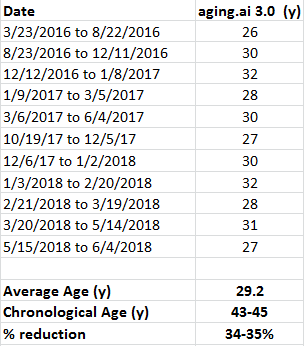My goal is to break the world record for lifespan, 122 years, which is currently held by Jean Calment. How do I plan to do that? A good start would be calorie restriction (CR), a diet where you eat 10-30%+ less calories than your normal intake. CR is the gold standard for increasing lifespan in a variety of organisms, including yeast, flies, worms, and rodents (McDonald et al. 2010).
With the goal of maximizing my health and lifespan, in April 2015, I started a CR diet. Inherent in that was weighing all my food and recording it on an online website that tracks macro-and micro-nutrients. From then until March 2016, I was pretty good at keeping my calories relatively low, as I averaged 2302 calories. However, since 3/2016, it’s been exceedingly difficult to keep my calories that low, as I’ve averaged 2557 calories/day. So is having a higher calorie intake worse for my lifespan goal than a lower calorie intake?
Maybe not. In addition to tracking my daily nutrition since 2015, I’ve also had regular blood testing performed. I’ve measured the typical things that you get at a yearly checkup, including the lipid profile (triglycerides, total cholesterol, LDL, HDL, VLDL) markers of kidney and liver function (BUN, creatinine, uric acid, and ALT, AST, respectively), and the complete blood count (red and white blood cells, and their differentials). By tracking my daily nutrition and circulating biomarkers, I’m able to quickly intervene on any potential aging and disease-related mechanisms by using my diet to optimize my circulating biomarkers.
On my quest for optimal health and lifespan, biological age is more important than my chronological age (I’m 46y). So what’s my biological age? Between 2016-2019, the group at Insilico Medicine published 2 papers that included circulating biomarker data from more than 200,000 people (Putin et al. 2015, Mamoshina et al. 2018) to derive a biological age predictor (aging.ai). So what’s my biological age?
Shown below is my predicted biological age over 13 blood tests from 3/2016 to 6/2019:

Although I wasn’t on a CR diet during that time, my average biological age was 29.2 years, which is ~34% younger than my chronological age. Would my biological age be even younger with a lower calorie intake? I’m working on reducing my calorie intake again (it’s not easy for me), so stay tuned for that!
Here are the my biomarker values corresponding to each blood test, for anyone who wants to double check the results:

References
Mamoshina P, Kochetov K, Putin E, Cortese F, Aliper A, Lee WS, Ahn SM, Uhn L, Skjodt N, Kovalchuk O, Scheibye-Knudsen M, Zhavoronkov A. Population specific biomarkers of human aging: a big data study using South Korean, Canadian and Eastern European patient populations. J Gerontol A Biol Sci Med Sci. 2018 Jan 11.
McDonald RB, Ramsey JJ. Honoring Clive McCay and 75 years of calorie restriction research. J Nutr. 2010 Jul;140(7):1205-10.
Putin E, Mamoshina P, Aliper A, Korzinkin M, Moskalev A, Kolosov A, Ostrovskiy A, Cantor C, Vijg J, Zhavoronkov A. Deep biomarkers of human aging: Application of deep neural networks to biomarker development. Aging (Albany NY). 2016 May;8(5):1021-33.
If you’re interested, please have a look at my book:

Hi Dr. Lustgarten,
Very interesting analysis! Do you happen to know the equation they use for the calculation and how certain values impact the results? I threw my values into the 3.0 calculator on the aging.ai website and got a result similar to my actual age but my wife put her values in and it says she is 20 years older than her physical age! I can’t see anything ‘wrong’ with her bloodwork so I am a bit confused about how they determine the measured age. Below is a link to her biomarkers for reference.
LikeLike
That’s interesting, Dax-your wife’s data looks normal, I don’t see anything that would suggest a biological age 20 years older than her chronological age. I’d reach out to poly@insilicomedicine.com, the company that derived the equation.
LikeLike
Thanks for the reply. I will let you know if they come back with anything informational. Take care!
LikeLike
Dax, here are their 2 papers where they derived the aging.ai equations:
https://academic.oup.com/biomedgerontology/advance-article/doi/10.1093/gerona/gly005/4801287
https://www.ncbi.nlm.nih.gov/pubmed/27191382
LikeLike
Great work Mile! I have the same goal, as I am sure many do. I am sure that record will fall many times before either of us get close. I have been using optimum lifestyle, metformin, rapamycin and many supplements to slow aging and will add an ACE inhibitor (Lisinipril) per Dr. Al Green’s “rapamycintherapy.com” to achieve same. May start doing more blood tests soon since they are gradually improving.
LikeLike
It’s all about the biomarkers, Dennis! Hopefully yours are improved using those purported geroprotectors.
LikeLike
Do you happen to know the ideal values for serum phosphorus, calcium and PTH?
LikeLike
I haven’t reviewed serum phosphorus or PTH yet, but I have for serum calcium. Without correcting for serum albumin, between 8.8-9.6 is associated with lowest risk for all-cause mortality (PMID 8964843, PMID 19948843). there are also studies investigating the association between serum calcium with all-cause mortality risk after adjusting for serum albumin (PMID 27631543, PMID 22573406, PMID 29381079).
Note that serum (or plasma) calcium was not significantly associated with risk of death from all causes in the 27,158 subjects of PMID 23860708, the 4,003 subjects of PMID 23581630, or the 371 subjects of PMID 24299047.
Also, Calcium corrected for albumin was not associated with all-cause mortality risk in the 4,003 subjects of PMID 23581630, or the 2,338 subjects of PMID 23071162
LikeLike
Hmm… mine has historically been in that range but my latest figure is 10.1, which is clearly higher than ideal. However my serum albumin (46g/L) is higher than what’s considered typical of people my age (I’m turning 44).
LikeLike
Pingback: Quantifying Biological Age – Michael Lustgarten
Pingback: 1.7 Years of Biological Aging In The Past 3.6 years – Michael Lustgarten